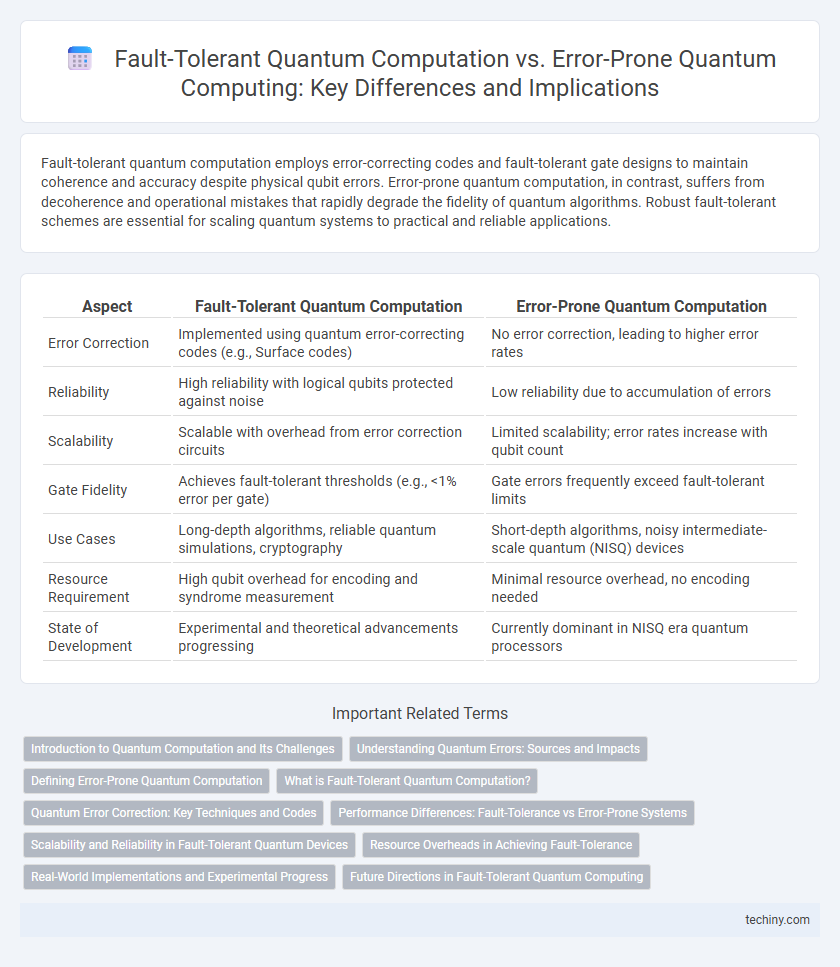Fault-tolerant quantum computation employs error-correcting codes and fault-tolerant gate designs to maintain coherence and accuracy despite physical qubit errors. Error-prone quantum computation, in contrast, suffers from decoherence and operational mistakes that rapidly degrade the fidelity of quantum algorithms. Robust fault-tolerant schemes are essential for scaling quantum systems to practical and reliable applications.
Table of Comparison
| Aspect | Fault-Tolerant Quantum Computation | Error-Prone Quantum Computation |
|---|---|---|
| Error Correction | Implemented using quantum error-correcting codes (e.g., Surface codes) | No error correction, leading to higher error rates |
| Reliability | High reliability with logical qubits protected against noise | Low reliability due to accumulation of errors |
| Scalability | Scalable with overhead from error correction circuits | Limited scalability; error rates increase with qubit count |
| Gate Fidelity | Achieves fault-tolerant thresholds (e.g., <1% error per gate) | Gate errors frequently exceed fault-tolerant limits |
| Use Cases | Long-depth algorithms, reliable quantum simulations, cryptography | Short-depth algorithms, noisy intermediate-scale quantum (NISQ) devices |
| Resource Requirement | High qubit overhead for encoding and syndrome measurement | Minimal resource overhead, no encoding needed |
| State of Development | Experimental and theoretical advancements progressing | Currently dominant in NISQ era quantum processors |
Introduction to Quantum Computation and Its Challenges
Fault-tolerant quantum computation addresses the inherent susceptibility of quantum bits (qubits) to errors caused by decoherence and operational imperfections, which are significant challenges in quantum computation. Unlike error-prone computation that lacks robust correction, fault-tolerant methods implement quantum error correction codes such as the surface code to preserve quantum information over extended periods. These techniques are crucial for realizing scalable quantum processors capable of performing reliable quantum algorithms despite the fragile nature of qubits.
Understanding Quantum Errors: Sources and Impacts
Quantum errors primarily arise from decoherence, gate imperfections, and environmental noise, significantly impacting qubit fidelity and computation accuracy. Fault-tolerant quantum computation employs error correction codes and fault-tolerant gate designs to mitigate these errors, enabling reliable long-term quantum information processing. Understanding the sources and impacts of quantum errors is crucial for developing scalable quantum algorithms and hardware resistant to error propagation.
Defining Error-Prone Quantum Computation
Error-prone quantum computation refers to quantum processing systems susceptible to operational errors due to qubit decoherence, gate imperfections, and environmental noise. These errors degrade computational accuracy, leading to unreliable quantum algorithm outcomes. Addressing error-prone quantum computation is critical for advancing scalable quantum technologies and achieving practical quantum advantage.
What is Fault-Tolerant Quantum Computation?
Fault-tolerant quantum computation involves designing quantum algorithms and hardware that can detect and correct errors without disrupting the quantum information being processed. It uses quantum error-correcting codes and fault-tolerant gates to maintain coherence in qubits despite decoherence and operational faults. This approach is critical for scaling quantum computers to perform reliable and complex computations beyond the limitations of error-prone quantum systems.
Quantum Error Correction: Key Techniques and Codes
Quantum error correction relies on stabilizer codes, such as the surface code and Shor's code, to detect and correct qubit errors without collapsing quantum states. Fault-tolerant quantum computation integrates these codes with error syndrome measurements and logical gate constructions to suppress error rates below the fault-tolerance threshold. Efficient implementation of quantum error correction protocols is critical to maintaining coherence and achieving scalable, reliable quantum processors despite the inherent noise and decoherence in physical qubits.
Performance Differences: Fault-Tolerance vs Error-Prone Systems
Fault-tolerant quantum computation utilizes error-correcting codes such as surface codes or stabilizer codes to maintain computational accuracy despite qubit decoherence and gate errors, drastically improving overall performance. Error-prone quantum systems, lacking robust fault-tolerance mechanisms, suffer from rapid error accumulation, leading to exponential decay in fidelity and limited circuit depth. The performance gap is quantified by thresholds like the quantum error threshold, where fault-tolerant architectures remain scalable beyond this limit while noisy systems collapse under the same error rates.
Scalability and Reliability in Fault-Tolerant Quantum Devices
Fault-tolerant quantum computation employs error-correcting codes and logical qubits to maintain coherence and accuracy, enabling scalable quantum algorithms despite physical qubit errors. In contrast, error-prone quantum computation struggles with noise accumulation, severely limiting circuit depth and qubit count without robust error mitigation. Scalability and reliability in fault-tolerant quantum devices are critical for practical quantum advantage, as they allow larger, more complex computations with significantly reduced error rates, fostering the development of reliable quantum processors.
Resource Overheads in Achieving Fault-Tolerance
Fault-tolerant quantum computation demands substantial resource overheads, including a significant increase in qubits and quantum gate operations to implement error-correcting codes like surface codes. Error-prone quantum computation, lacking these protective measures, operates with fewer physical resources but suffers from high error rates that limit the depth and reliability of quantum circuits. Balancing resource overheads against error suppression efficiency remains a critical challenge in scaling practical, fault-tolerant quantum processors.
Real-World Implementations and Experimental Progress
Fault-tolerant quantum computation leverages error-correcting codes like surface codes and concatenated codes to maintain qubit coherence, enabling scalable quantum algorithms despite hardware imperfections. Recent experimental progress includes implementations on superconducting qubits and trapped ions, demonstrating extended logical qubit lifetimes and fault-tolerant gate operations under real-world noise conditions. These advances distinguish fault-tolerant systems from error-prone quantum devices, which remain susceptible to decoherence and operational errors that limit computational reliability and scale.
Future Directions in Fault-Tolerant Quantum Computing
Future directions in fault-tolerant quantum computing emphasize the development of more scalable quantum error correction codes such as surface codes and quantum LDPC codes, which promise to significantly reduce qubit overhead. Advances in hardware architectures aim to integrate these codes with improved qubit coherence times and high-fidelity gate operations, enabling more reliable quantum processors. Research is also focused on fault-tolerant protocols tailored for near-term quantum devices, bridging the gap between error-prone quantum computations and fully error-corrected systems.
Fault-Tolerant Quantum Computation vs Error-Prone Computation Infographic

 techiny.com
techiny.com